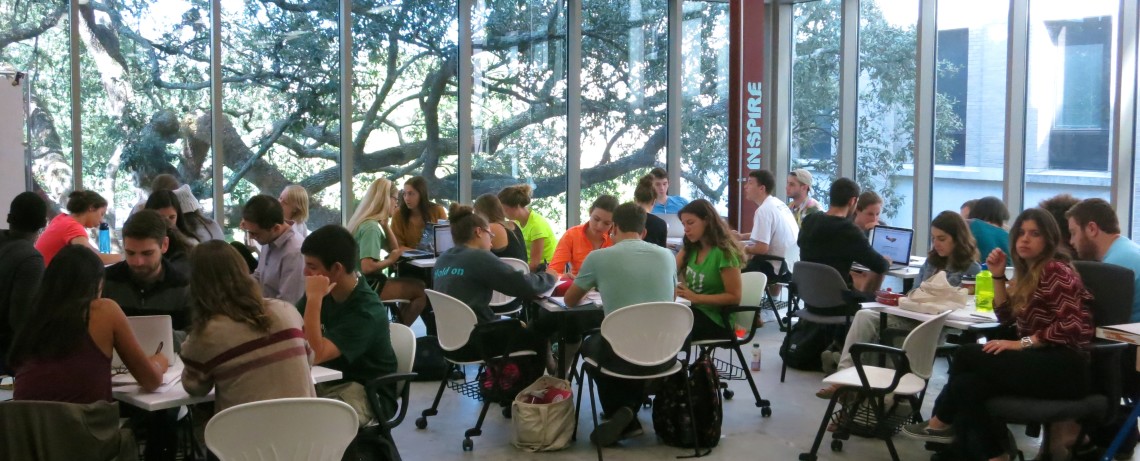
Some of the courses listed below may require pre-requisite classes, instructor’s approval to enroll, or a specific form to request enrollment. Students are expected to be proactive when attempting to enroll in courses outside their majors or minors. For consideration of other courses as SISE approved electives, contact Rebecca Otten, Director of the SISE Minor.
SISE 4570: SISE Internship
Instructor: CPS
Note: Students must secure their own internship placement. Visit the Center for Public Service website for internship opportunities.
Internship Seminars are based on discussion sessions, professional development workshops, guest speakers from local organizations, and student presentations. CPS Internship Coordinators place students in the appropriate seminar depending on their department for credit and their internship. Topics include:
- Communication Internship (limited to Communication major/minors only)
- Careers in Health Sciences
- Leadership and Ethics in Public Health
- Psychology Internship
- STEM Education Internship
- Public History Internship Seminar
- Topics in Community Engagement
SISE 4950 Advanced Design Thinking
Instructor: Allison Schiller
Pre-requisite: SISE 3010
This is a project-driven design thinking intensive to dive deeper into the design thinking framework for organizational change by engaging with a community partner. Objectives:
- Engage with and build a deeper understanding of the design thinking methods
- Practice methods for using empathy and a DT mindset to create opportunities for organizational growth
- Build a partnership with a community-based organization
- Deepen skills developed throughout the SISE minor
- Discover ways to improve organizational culture and problem-solving
SISE 4950 The Arts & Social Impact
Instructor: Sarah Woodward
Optional service-learning available
Pablo Picasso once said, “Every child is an artist. The problem is how to remain an artist once we grow up.” The purpose of this course is to examine the value of the arts in society, and more specifically the linkages between the arts, creative problem solving, and social impact. The capacity for artistic expression is one of the defining characteristics of being human. Yet, the arts are systematically devalued in public schools. And the myth of the “struggling artist” perpetuates the idea of the artist as an outcast. Drawing from multiple perspectives, we will explore the unique ways the arts contribute to social impact. We will discuss theories, read scholarly articles, examine case studies, and hear from guest speakers in the local arts community. We will specifically investigate the relationship between art and social impact in terms of (a) arts education, (b) social movements, and (c) economic and community development. Attention will be given to the ways artistic expression intersects with structures of class, gender, race, and geography.
SISE 4952 disABILITY
Instructors: Krystal Cleary, PhD, Cathy Lazarus, MD, & Anne-Marie Womack, PhD
People with disabilities are systematically excluded from cultural systems, spaces, and practices even though all of us, at one point or another, will likely be disabled. Critical disability studies productively reorients our basic assumptions about disability and ability, encouraging us to consider how disability functions as a civil rights issue, identity, culture, and social construction. Students in the course will analyze systems through an intersectional lens that centers lived experience, highlighting disability’s relationship with other facets of identity and power such as race, class, gender, sexuality, and citizenship. Because the disabled community is so diverse, each class will introduce students to a myriad of voices through readings and guest presentations, including visits to local agencies. By focusing on resources and gaps in New Orleans, in Louisiana, and in the United States, students will develop an understanding of disability issues over the life span. Students will leave with a clear understanding of disability as a general mode of inquiry that expands and transforms all areas of inquiry as well as a framework for positively impacting the future.
SISE 4953 Climate Change Across the Curriculum
Instructor: Thomas Sherry, PhD
Climate change is an environmental calamity already well under way. It threatens human civilizations and much of biological diversity, and thus we are all stakeholders in confronting and addressing the relevant challenges. “Business as usual” is impossible to justify, compelling us to ask what we can do, as individuals, institutions, and society. The goal of this course is to engage faculty and students in relevant disciplines across the curriculum at Tulane and beyond to implement design thinking as a way to explore solutions, large and small. This is not a science course, as important as science is to understanding climate change and its consequences. Instead, the course addresses a variety of issues and their interconnections, including the physical and biological scientific issues, human population and consumption, economics, energy production, ethical and moral issues (Philosophy, Sociology), education and communication, environmental justice and related political, Public Health, and climate change mitigation. Throughout the semester we will pivot between analyzing and understanding the threats to identifying solutions. Students will engage in the ideas primarily via writing and a design thinking term project.